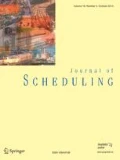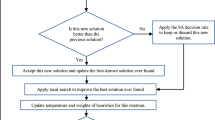Abstract
We consider the rescheduling on a single machine with release dates to minimize the makespan and total sequence disruption simultaneously. In the literature, a polynomial-time algorithm was presented for minimizing the makespan under a limit on the total sequence disruption. But the algorithm is not strongly polynomial. We present a strongly polynomial-time algorithm for finding all Pareto optimal points of the Pareto optimization problem. Consequently, the rescheduling to minimize the makespan under a limit on the total sequence disruption can be solved in a strongly polynomial time.
Similar content being viewed by others
References
Alagöz, O., & Azizoğlu, M. (2003). Rescheduling of identical parallel machines under machine eligibility constraints. European Journal of Operational Research, 149, 523–532.
Alagöz, O., & Azizoğlu, M. (2005). Parallel-machine rescheduling with machine disruptions. IIE Transactions, 37, 1113–1118.
Aytug, H., Lawley, M. A., McKay, K., Mohan, S., & Uzsoy, R. (2005). Executing production schedules in the face of uncertainties: A review and some future direction. European Journal of Operational Research, 161, 86–110.
Błażewicz, J., Ecrer, K., Schmidt, G., & Weglarz, J. (1993). Scheduling in computer and manufactureing systems. New York: Springer.
Brucker, P. (2007). Scheduling Algorithms (5th ed.). Berlin: Springer.
Church, L. K., & Uzsoy, R. (1992). Analysis of periodic and event-driven rescheduling policies in dynamic shops. International Journal of Computer Integrated Manufacturing, 5, 153–163.
Graham, R. L., Lawler, E. L., Lenstra, J. K., & Rinnooy Kan, A. H. G. (1979). Optimization and approximation in deterministic sequencing and scheduling: A survey. Annals of Discrete Mathematics, 5, 287–326.
Hall, N. G., & Potts, C. N. (2004). Rescheduling for new orders. Operations Research, 52, 440–453.
Hall, N. G., Liu, Z. X., & Potts, C. N. (2007). Rescheduling for multiple new orders. Informs Journal on Computing, 19, 633–645.
Hall, N. G., & Potts, C. N. (2010). Rescheduling for job unavailability. Operations Research, 58, 746–755.
Hoogeveen, H. (2005). Multicriteria scheduling. European Journal of Operational Research, 167, 592–623.
Lee, C.-Y., Leung, J. Y.-T., & Yu, G. (2006). Two machine scheduling under disruptions with transportation considerations. Journal of Scheduling, 9, 35–48.
Mason, S. J., Jin, S., & Wessels, C. M. (2004). Rescheduling strategies for minimizing total weighted tardiness in complex job shops. International Journal of Production Research, 42, 613–628.
Mehta, S. V. (1999). Predictable scheduling of a single machine subject to breakdowns. International Journal on Computing-Integrated Manufacturing, 12, 15–38.
Mu, Y. D., Guo, X., & (2009a). On-line rescheduling to minimize makespan under a limit on the maximum sequence disruption. Proceeding of the 2009 International Conference on Services Science. Management and Engineering, IEEE Computer Society, 479–482, doi:10.1109/SSME.2009.44.
Mu, Y. D., Guo, X., & (2009b). On-line rescheduling to minimize makespan under a limit on the maximum disruptions. Proceeding of the 2009 International Conference on Management of e-Commerce and e-Government. IEEE Computer Society, 141–144, doi:10.1109/ICMeCG.2009.26.
Mu, Y. D., & Tian, X. Z. (2010). Pareto optimizations of objective and disruptions for rescheduling problems. Journal of Henan University (Natural Science), 40, 441–444.
Özlen, M., & Azizoğlu, M. (2009). Generating all efficient solutions of a rescheduling problem on unrelated parallel machines. International Journal of Production Research, 47, 5245–5270.
T’kindt, V., & Billaut, J. C. (2006). Multicriteria scheduling: theory, models and algorithms (2nd ed.). Berlin: Springer.
Unal, A. T., Uzsoy, R., & Kiran, A. S. (1997). Rescheduling on a single machine with part-type dependent setup times and deadlines. Annals of Operations Research, 70, 93–113.
Vieira, G. E., Herrmann, J. W., & Lin, E. (2003). Rescheduling manufacturing systems: A framework of strategies, policies and methods. Journal of Scheduling, 6, 39–62.
Wu, S. D., Storer, R. H., & Chang, P.-C. (1992). A rescheduling procedure for manufacturing systems under random disruptions. In G. Fandel, T. Gulledge, & A. Jone (Eds.), New directions for operations research in manufacturing (pp. 292–308). Berlin: Springer.
Wu, S. D., Storer, R. H., & Chang, P.-C. (1993). One machine rescheduling heuristics with efficiency and stability as criteria. Computers and Operations Research, 20, 1–14.
Yuan, J. J., & Mu, Y. D. (2007). Rescheduling with release dates to minimize makespan under a limit on the maximum sequence disruption. European Journal of Operational Research, 182, 936–944.
Yuan, J. J., Mu, Y. D., Lu, L. F., & Li, W. H. (2007). Rescheduling with release dates to minimize total sequence disruption under a limit on the makespan. Asia-Pacific Journal of Operational Research, 24, 789–796.
Acknowledgments
The authors would like to thank the associate editor and three anonymous referees for their constructive comments and kind suggestions. Research supported by NSFC (11271338) and NSFC (11171313).
Author information
Authors and Affiliations
Corresponding author
Rights and permissions
About this article
Cite this article
Zhao, Q., Yuan, J. Pareto optimization of rescheduling with release dates to minimize makespan and total sequence disruption. J Sched 16, 253–260 (2013). https://doi.org/10.1007/s10951-013-0311-7
Received:
Accepted:
Published:
Issue Date:
DOI: https://doi.org/10.1007/s10951-013-0311-7




